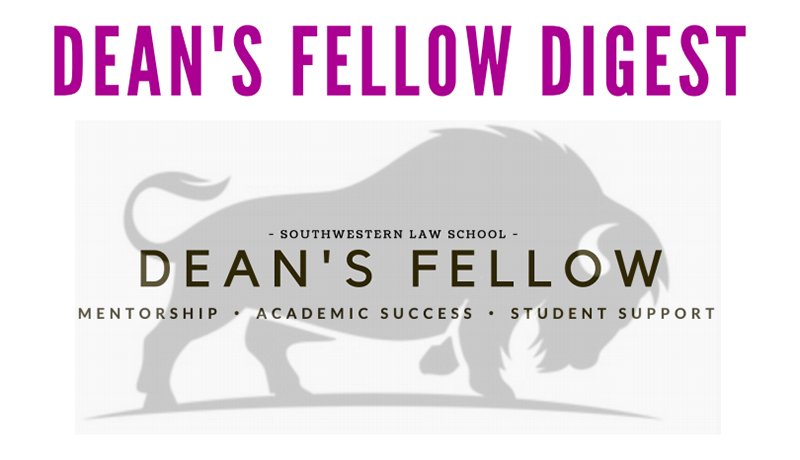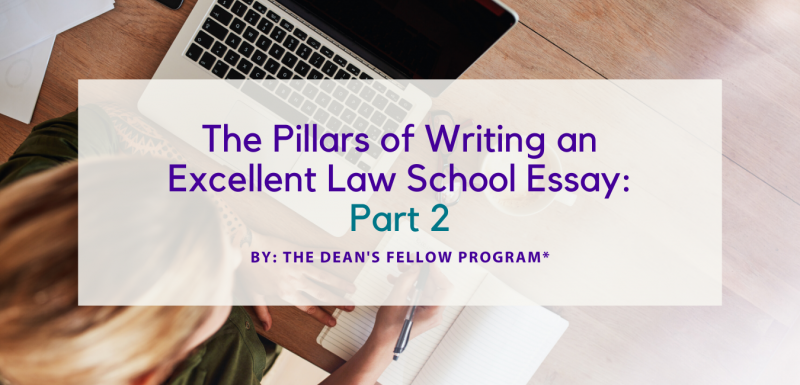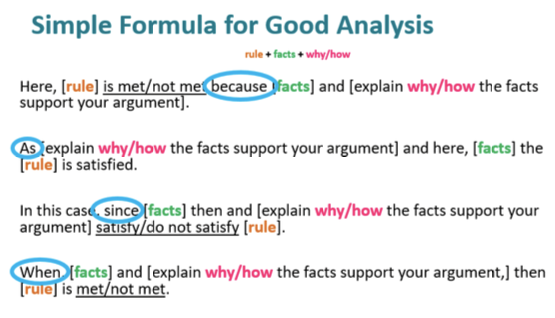SWLAW Blog | Dean's Fellow Digest

May 3, 2021
Dean's Fellow Digest Issue #29 - The Pillars of Writing an Excellent Law School Essay: Part II
Issue: 2021-4-30
Dean's Fellows consistently strive to support students in realizing their full academic potential, leading ultimately to success on the bar exam and in the workplace. To support all Southwestern students in this goal, the Dean's Fellows created this Digest as a way to check in at critical times throughout the semester with helpful tips, strategies, and encouragement.
IN THIS ISSUE:
- The Pillars of Writing an Excellent Law School Essay: Part II

Welcome back to the pillars of writing an excellent law school essay, part two! If you would like to review part one, please click here.
As a recap of where we left off last week, we ended by addressing the below four points in detail.
For each legal issue identified,…
- Organizes the discussion of the issue using the IRAC format.
- Correctly and completely states all the rules relevant to the issue.
- Where necessary, explains what particular elements or factors of the rule mean.
- Methodically applies each and every element/factor of the rule to the facts.
This week, let’s pick up where we left off and continue to delve into excellent structure and analysis for each legal issue identified on an essay exam:
When discussing a particular component of a rule (e.g. an element or factor), identifies all and only those particular facts that are relevant to whether the component is satisfied.
Common Error: Leaving out facts that are relevant to the element/factor being analyzed.
- One way to avoid leaving relevant facts out is to mark up the prompt while you are reading it. You can write in the margins, circle the word or sentence, or underline/highlight in a different color. Sometimes it is not that we don’t realize that the fact is triggered, but instead get so caught up in writing that we forget to bring it up. That is why it is so important to read and mark up the prompt carefully, as well as organize (or outline) your response.
~ Katherine Vazquez
Where necessary, explains why the identified facts show that the component of the law is or is not satisfied.
Common Error: Identifying facts that support the conclusion that the element/factor is or is not satisfied but failing to explain why the facts support that conclusion.
Remember to “follow the formula,” and when in doubt, ask yourself “because why” to ensure you are following through with each analytical explanation provided on your essay exams.

*The videos on essay writing remain available on Foundations of Law and Practice Canvas Pages for a refresher. Your Foundations Faculty also remain available should you have questions or concerns.
Where necessary, identifies and addresses opposing arguments that could be reasonably made concerning whether the element/factor is or is not satisfied.
Common Error: Failing to discuss a counterargument that could reasonably be made with respect to whether a particular element/factor is satisfied.
If the question is about burglary, which requires entry and an intent to commit a felony within, and the facts discuss an arguable matter regarding when D’s intent was formed, it would be a good time to make opposing arguments. For example, the facts state that D entered the premises with the intent to leave a gift for the resident and leave immediately. Once inside, D saw a ring on the table and decided to take it. In the analysis, you would talk about D’s intent before and during entry into the premises. Then, in another paragraph, you would say: “On the other hand, D was not welcome on the property by the resident, and once D saw the ring, they formed the intent to commit a felony, and did so when they took the ring before leaving.” Then, you would conclude with whichever was the stronger argument, depending on the facts of the case. A good rule of thumb is to start off with the weaker argument and end with the stronger one, which would hold more weight following a weak argument.
~ Lilian Zohrab
Not raising an argument for the other side means at times leaving substantial points on the table. Thus, one will likely miss a good chunk of points by stating: “The defense will argue that X did not have the intent to kill because he did not contemplate the homicide in the 10 seconds that passed from when X encountered Y and until X stabbed Y.” More likely than not, there are facts to support the prosecution’s argument that X had the intent to kill Y because ample time has passed after he got off his phone, turned off his ignition and slowly walked towards Y. Making a balanced argument is key. We can embrace/favor a side and reach one conclusion or another, but we must not disregard the arguments that must be raised for the other side.
~ Elena Cordonean
Never conclude yourself out of points. What I mean is, it is important to make arguments for both parties (if applicable as mentioned above) on a given element of the law, but continue addressing the remaining elements of the rule, and come to an overarching conclusion on the legal issue, even if your previous elemental conclusion sways toward one component of the law not being satisfied.
~Aly Isenberg
For each element/factor analyzed, states a reasonable “mini conclusion” about whether the particular element is satisfied, or which direction the particular factor weighs in.
Common Error: Stating a conclusion that cannot reasonably be drawn from the facts.
For many questions in the law, there is no right answer, only reasonable arguments that can be made on both sides. However, sometimes there is a clearly correct answer that is a “slam dunk” in light of the facts.
After analyzing whether each element/factor of the rule is satisfied, states an overall conclusion on the issue being analyzed that is supported by the analysis you have offered.
Common Error: Forgetting to state a conclusion.
Once you’ve discussed each element in separate paragraphs, we mentioned above that each element should have a mini-conclusion, such as, “Since D stepped foot through the doorway of P’s home, he entered P’s home, therefore, the element of entry is satisfied.” Subsequent to your discussion of each element, also conclude on the legal issue as a whole—a conclusion that relates back to the call of the question. Following the same example, you could conclude that “since D entered P’s home when he stepped through the doorway, and D entered with the intent to commit a felony therein because he intended to feloniously murder P when he entered, D therefore committed a burglary.”
~ Lilian Zohrab
From all the Dean’s Fellows, wishing you success on your Spring Semester final exams!
*About the Authors:
ELENA CORDONEAN
 Elena is a 2L evening student who holds two master’s degrees obtained in Europe before entering law school. At Southwestern, she intends to focus her academic coursework on criminal, international, and environmental law. She is fluent in five languages and is interested in building a strong educational background that would help her pursue a career at an intergovernmental organization. While attending Southwestern, Elena works as a law clerk for a personal injury law firm where she is involved in all aspects of the pre-litigation and litigation process.
Elena is a 2L evening student who holds two master’s degrees obtained in Europe before entering law school. At Southwestern, she intends to focus her academic coursework on criminal, international, and environmental law. She is fluent in five languages and is interested in building a strong educational background that would help her pursue a career at an intergovernmental organization. While attending Southwestern, Elena works as a law clerk for a personal injury law firm where she is involved in all aspects of the pre-litigation and litigation process.
Elena believes that the study of law, while providing a lifetime of opportunities, invaluable connections, and the ability to attain the highest degree of self-realization, is not without challenge. She is excited to help the incoming evening students to succeed because it is not about the individual but rather the collaboration of skills and experience that will ensure success and uphold the values that are true to all of us.
ALEXANDRA ISENBERG

Aly is a Traditional Day 2L student who graduated from San Diego State University in 2017 with a B.A. in Psychology and a minor in cognitive and behavioral neuroscience. Aly is working towards a career in civil litigation and advocacy. In addition to serving as a Dean's Fellow, Aly is a member of Southwestern’s Journal of International Law. This summer Aly worked as a law clerk for the Los Angeles District Attorney’s Office and would be happy to discuss the experience with anyone interested in applying for an externship with the DA’s office.
Aly looks forward to getting to know all of you and helping you navigate 1L. Please don't hesitate to schedule a meeting.
KATHERINE VAZQUEZ

Katherine Vazquez is a 2L traditional day student. Before law school, Katherine interned with the Los Angeles County District Attorney’s Office in the Post-Conviction Litigation and Discovery Unit.
Last year, Katherine externed at the U.S. District Court for the Central District of California. She was also a law clerk in the Removal Defense Clinic. This summer 2020, Katherine will be an extern at the Office of Legislative Counsel in Sacramento.
In addition to serving as a Dean’s Fellow, Katherine is a Staff Editor for the Southwestern Journal of International Law and a Contributing Editor for Litigation News, a publication of the American Bar Association’s Section of Litigation.
In her free time, Katherine likes to hang out at the beach with her friends and dogs, Django and Jami.
LILIAN ZOHRAB
 Lilian is a 2L Evening student who graduated from Cal State Fullerton with a B.A. in Sociology. She currently works full-time for the County of Los Angeles Human Resources Department and volunteers for the County of Los Angeles District Attorney’s Office. Lilian intends to complete a concentration in Criminal Law to advocate for victims of violence.
Lilian is a 2L Evening student who graduated from Cal State Fullerton with a B.A. in Sociology. She currently works full-time for the County of Los Angeles Human Resources Department and volunteers for the County of Los Angeles District Attorney’s Office. Lilian intends to complete a concentration in Criminal Law to advocate for victims of violence.
Lilian has worked full time throughout her academic career. She knows what it feels like to have a busy schedule and is excited to make herself available to help you work through yours, as well. Lilian looks forward to being a resource for you as you dive into your first year at Southwestern.
Southwestern Law School Dean's Fellows | Scheduling and Booking Website
Dean’s Fellows are upper-division students with strong academic skills who go through a rigorous application and training process. They are an integral part of the Academic Success and Bar Preparation Department. They are carefully selected based on their academic excellence and ability to teach other students best-practice study methods that will help them become acclimated to the study of law. Dean’s Fellows meet with students as academic mentors.
Please click HERE to make an appointment with a Dean's Fellow.